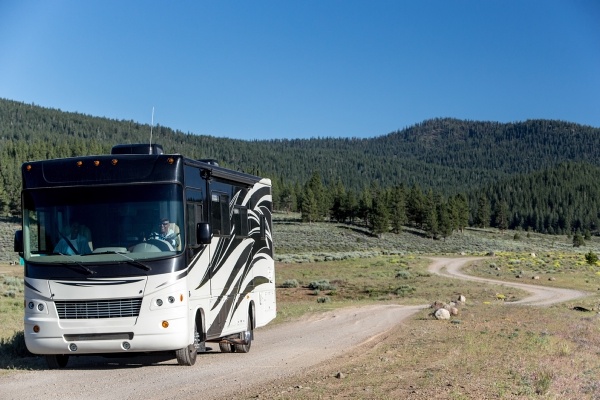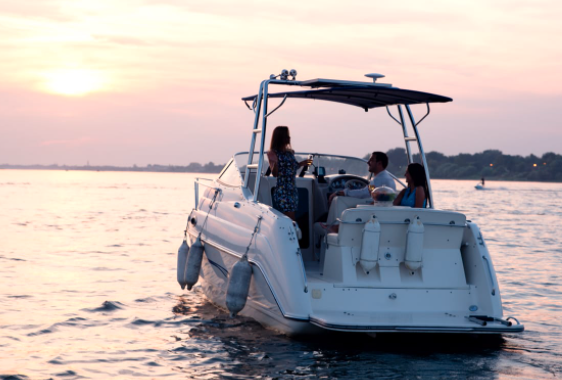- (817) 236-2886
- 8101 Boat Club Rd Suite 325, Fort Worth, TX 76179
- Mon - Fri: 8:30 - 5:00pm
Boat and RV Insurance
Boats afford recreation and adventure to their owners, but
they come with risks, as well. Don’t let an accident or
disaster sink you—understand how to insure your prized
vessel.
Boat insurance is available in two types, each with different parameters and different premium costs.
- Actual Cash Value: Pay’s for replacement costs less depreciation at the time of the loss. In the event of a total loss, used boat pricing guides and other resources are used to determine the vessel’s approximate market value. Partial losses are settled by taking the total cost of the repair less a percentage for depreciation.
- Agreed Value: Is based on a valuation of your vessel that you and your insurer have agreed upon; in event of a total loss you will be paid the “agreed amount.” Agreed Amount Value policies will also replace old items with new ones in the event of a partial loss, without any deduction for depreciation.
Boat Insurance FAQ
Most frequent questions and answers
The size, type and value of the craft and the water in which you use it factor into what type of insurance you need and how much you will pay for insurance coverage. As with any insurance policy, make sure you understand exactly what perils are covered and what your policy limits are.
- Small craft may be covered under your standard homeowners policy or renters insurance policy. Most insurers provide limited coverage for property damage for small boats such as canoes, small sailboats or small powerboats with less than 25 mile per hour horsepower. Coverage generally includes the boat, motor and trailer combined. Liability coverage is typically not included, but it can be added as an endorsement to a homeowners policy.
- Larger and faster boats such as yachts require a separate insurance policy (as do personal watercraft such as jet skis).
Typical boat insurance policies cover physical damage to the boat itself. They also cover property damage, theft and medical payments, each with different deductibles. Your insurer may offer additional, optional coverage for trailers and boat accessories.
Boat insurance policies generally provide broader liability protection than a homeowner’s policy. However, depending on the assets that are at risk, boat owners may also consider purchasing an umbrella liability policy, which will provide additional protection for their boat, home and car.
Boat insurance is available in two types, each with different parameters and different premium costs.
- Actual Cash Value: Pay’s for replacement costs less depreciation at the time of the loss. In the event of a total loss, used boat pricing guides and other resources are used to determine the vessel’s approximate market value. Partial losses are settled by taking the total cost of the repair less a percentage for depreciation.
- Agreed Value: Is based on a valuation of your vessel that you and your insurer have agreed upon; in event of a total loss you will be paid the “agreed amount.” Agreed Amount Value policies will also replace old items with new ones in the event of a partial loss, without any deduction for depreciation.
Here are some of the common and optional boat coverages. Make sure you understand what exactly your policy will pay for and what the limits are.
- Physical loss or damage to the actual boat, including the hull, machinery, fittings, furnishings and permanently attached equipment. Physical damage exclusions might include normal wear and tear, damage from insects, mold, animals (such as sharks), zebra mussels, defective machinery or machinery damage.
- Theft of the boat.
- Bodily injury to persons other than the boat owner or his or her family.
- Damage caused to someone else’s property.
- Guest passenger liability—that is, any legal expenses incurred by someone using the boat with the owner’s permission.
- Medical payments for injuries to the boat owner and other passengers.
- Trailer or boat accessories.
- Loss or theft of belongings may or may not be covered. Your homeowner’s policy may provide some coverage and boaters should specifically inquire about special equipment kept on the boat, such as fishing gear, to make sure it is covered.
- Towing in the event of an accident.
If you’re thinking of obtaining boat insurance or changing insurers, inquire about discounts for the following:
- Diesel powered craft, which are less hazardous than gasoline powered boats as they are less likely to explode
- Coast Guard approved fire extinguishers
- Ship-to-shore radios
- Crew completion of boating and water safety education courses, such as those offered by the Coast Guard Auxiliary, U.S. Power Squadrons, or the American Red Cross.
- Multi-policies with the same insurer, such as a car, home or umbrella policy.
- Two years of claims-free experience
There are thousands of recreational boating accidents per year, which can be costly in injuries and damages. Contributing factors to boating disasters include traveling too fast for water or weather conditions, driving under the influence of drugs or alcohol, failing to follow boating rules and regulations, carelessness and inexperience.
The best way to ensure your years of accident- and claims-free experience is to follow boating safety practices.
- Properly equip your vessel with required navigation lights and with a whistle, horn or bell. Have on hand plenty life jackets and emergency safety devices such as a paddle or oars, a first-aid kit, a supply of fresh water, a tool kit and spare parts, a flashlight, flares and a radio. Carry one or more fire extinguishers, matched to the size and type of boat and keep them readily accessible and in condition for immediate use.
- Before you sail or launch, check weather forecasts before heading out to ensure good boating conditions. Let someone know where you’re going and when you expect to return. Check engine, fuel, electrical and steering systems, especially for exhaust-system leaks.
- When you have passengers and/or a load, pay attention when loading. Distribute the load evenly and don’t overload. In a small boat, warn passengers not to stand up or shift weight suddenly. Make sure that every person on board the boat gets and wears a life jacket.
- Know and obey marine traffic laws; learn distress signals and other boating signals.
- In shallow waters, keep an alert lookout for other watercraft, swimmers, floating debris and shallow waters.
- Don’t operate the boat while under the influence of alcohol or drugs, or allow anyone who might be impaired to operate the vessel.
I am item content. Click edit button to change this text. Lorem ipsum dolor sit amet, adipiscing elit. Ut elit tellus, luctus nec ullamcorper mattis, pulvinar dapibus leo.
RV Insurance
From trips to Big Bend to Beaumont. Make sure you’re insured along the way.
Affordable RV
Insurance

Enjoy a good time on the road while also enjoying piece of mind that your R.V. is insured along the way.
R.V. FAQ
Most frequent questions and answers
RV insurance is an agreement between you and your insurance company that protects your motorhome, travel trailer, camper, fifth wheel, etc. You’ll choose from a variety of coverages meant to protect your vehicle and provide peace of mind on trips and vacations or if you use your RV as a permanent residence. If you’re “driving” a motorhome, you’ll also need liability coverage to stay legal on the road. But if you’re “pulling” a travel trailer, your state won’t require you to insure the RV, as you’re already covered for liability on your auto insurance policy.
When you buy RV insurance, your insurer or agent will ask simple questions about you, your RV, and how often you use it. You’ll then select coverages that will best protect you and your vehicle. Generally, more coverage means a higher price. If you damage your vehicle or you’re responsible for someone else’s damages or injuries, you’ll file a “claim” with your insurer. If your claim is covered, they’ll pay for the losses or injuries up to your coverage limits.
I am item content. Click edit button to change this text. Lorem ipsum dolor sit amet, consectetur adipiscing elit. Ut elit tellus, luctus ullamcorper mattis, pulvinar dapibus leo.
Yes. You must have at least the state minimum for liability, since motorhomes are driven and not towed. When quoting motorhome insurance, all insurers will let you know the minimum requirements in your state. Failure to carry liability insurance could result in a revoked license, fines, or even jail time.
Because you’re not actually driving your travel trailer, you aren’t required by law to have insurance on a vehicle that you tow with a car or truck. However, your travel trailer is often a valuable asset, and should be protected the same way you insure your home, car, etc.
Most travel trailer policies include comprehensive coverage. It’s up to you if you want to add collision, but most financiers will require you to carry both.
Comprehensive and collision: Comprehensive protects your RV from theft, vandalism, windshield damage, acts of nature, rocks and debris kicked up by other vehicles, and accidents/impact with animals. A deductible applies.
Collision covers damage to your RV if you’re in an accident and hit another vehicle or object, regardless of fault. Note that you won’t be able to purchase collision without also purchasing comprehensive. A deductible also applies.
Bodily injury and property damage liability: Pays for damage or injuries you cause while driving your motorhome. It also covers legal fees that may result from the accident. In most states, this is the only required coverage. Coverage does not apply to travel trailer policies.
Like with other types of insurance, RV insurance pricing comes down to risk. How likely are you to file a claim and what will it cost to repair or replace your motorhome or trailer? Here are some factors that will help determine what you’ll pay:
Type: A large, state-of-the-art motorhome will typically cost more to insure than a smaller, used RV. Typically Class A motorhomes are more expensive to insure than Class C motorhomes simply because they’re bigger and more expensive. Similarly, a conventional travel trailer will usually cost more to insure than a truck camper.
Use: Usually, the more you use your RV, the more you’ll pay to insure it. If you live in your RV, you are more of a risk to your insurer than someone who uses their RV recreationally, a few weekends per year.
Driving experience: It’s a whole new ballgame when driving a motorhome compared to a car. Adjusting to a bigger vehicle, different blind spots, and challenging turns takes time, so RV drivers with more experience will pay less for insurance than newer drivers.

Treating Your Insurance Needs With the Utmost Importance
Working hours
Monday-Friday: 8:30-5:00pm
We are here
8101 Boat Club Rd.
Suite 325
Fort Worth, Texas 76179
Copyright © 2020 Lone Star Insurers. All rights reserved.
- 817-236-2886
- pjacobs@lonestarinsurers.com
- 8101 Boat Club Rd. Suite 325 Fort Worth, Texas 761797

